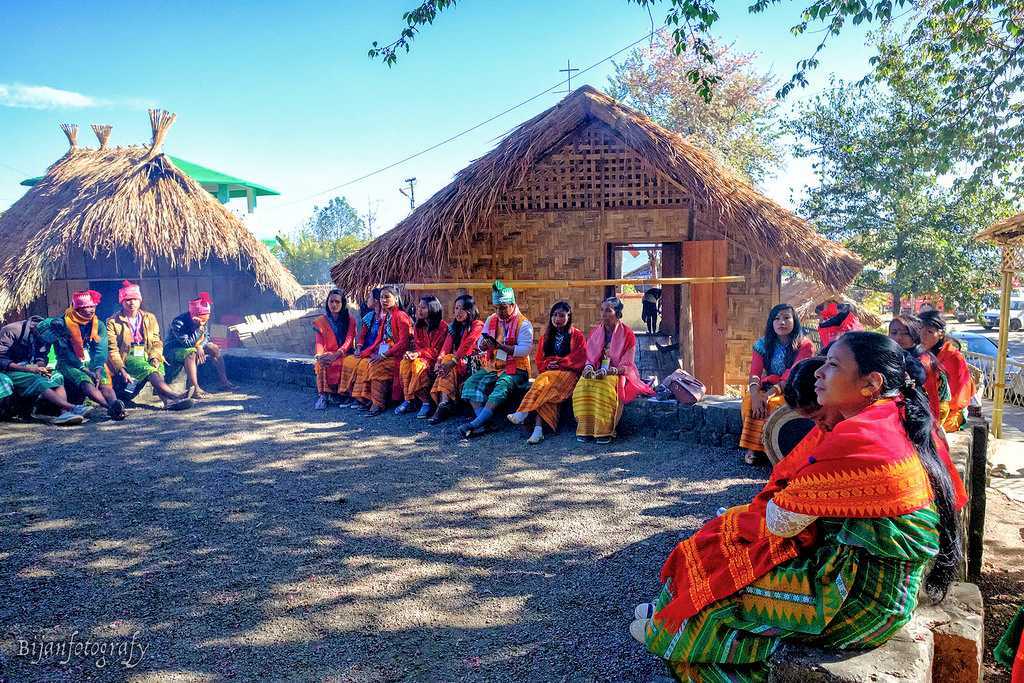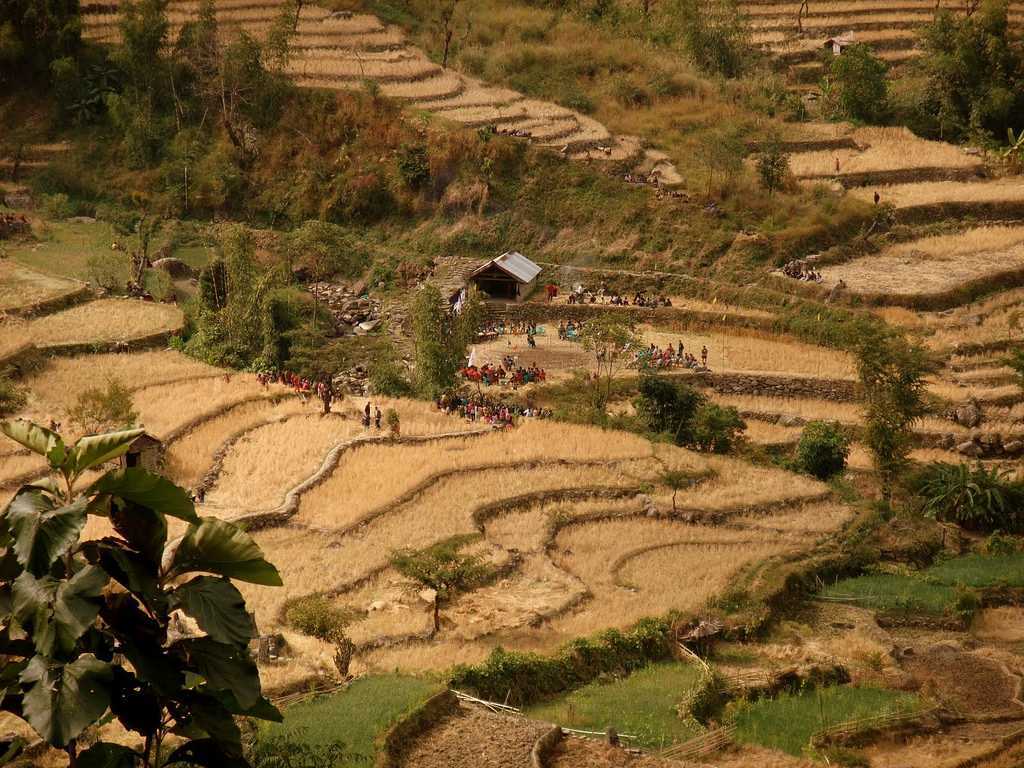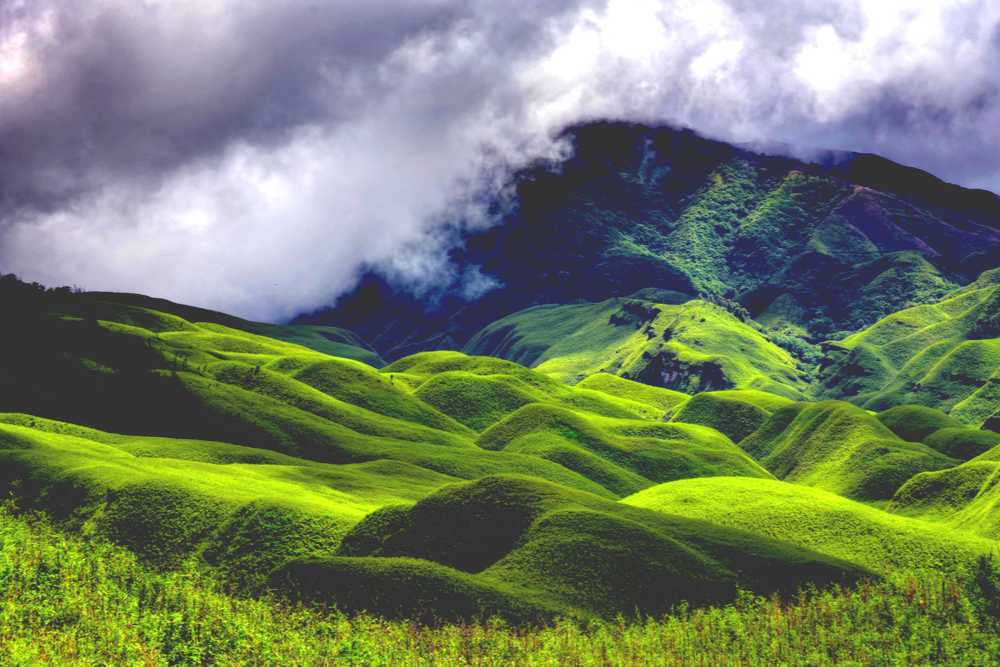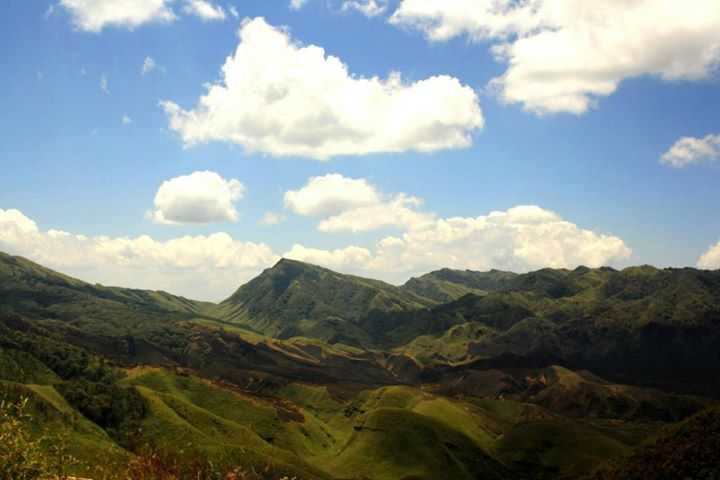TOUPHEMA VILLAGE
Are you tired of the hustle and bustle of city life? Do you yearn for a simpler way of living? Look no further than Touphema village! Nestled in the hills of Nagaland, this quaint little village is a hidden gem waiting to be discovered.
From the moment you arrive, you'll feel like you've stepped back in time. The traditional huts and lush greenery will transport you to a world that's far removed from the chaos of modern living.
But don't let the rustic charm fool you - there's plenty to see and do in Touphema. Take a stroll through the village market, where local artisans sell their wares. You'll find everything from hand-woven shawls to intricately carved wooden figurines.
If you're feeling adventurous, why not try your hand at some traditional Naga cooking? The locals will be more than happy to show you how it's done - just be prepared for some spicy surprises!
And if all that excitement gets too much, simply kick back and relax with a cup of local tea. Made with fresh herbs and spices, it's the perfect antidote to a stressful day.
So what are you waiting for? Pack your bags and head on over to Touphema village - your inner peace awaits!
Table of Contents
- Introduction
- History and Culture of Touphema Village
- How to Reach and getting around Touphema Village
- Weather of Touphema Village
- Places to Visit in Touphema Village
- Food Options and Local Cuisine of Touphema Village
- Best areas for Accommodation in Touphema Village
- Shopping in Touphema Village
- Nightlife in Touphema Village
- Festivals and Events in Touphema Village
- Tips for Travelers travelling to Touphema Village
- FAQs
History and Culture of Touphema Village
Touphema village is a quaint little village located in the Indian state of Nagaland. The village is known for its rich cultural heritage and vibrant traditions. Touphema village has a long and interesting history that dates back to the ancient times when the Naga tribes settled in the region.
Legend has it that Touphema was founded by a powerful Naga warrior named Kephrune. He was known for his bravery and his ability to protect his people from enemy attacks. Over time, the village grew and became a thriving community of farmers, traders, and artisans.
Today, Touphema is famous for its unique cultural practices that have been passed down from generation to generation. The villagers are proud of their heritage and celebrate it with great enthusiasm. The annual Touphema festival is a highlight of the year, where locals dress up in traditional attire and perform folk dances.
Visitors to Touphema can experience the local culture firsthand by staying in one of the traditional Naga huts or trying their hand at weaving or pottery making. The village also has a museum that showcases various artifacts and tools used by the Naga tribes.
Despite being a small village, Touphema has a strong sense of community spirit. The villagers are warm and welcoming, always ready to share their stories and traditions with visitors. If you're looking for an offbeat destination that's rich in history and culture, Touphema should definitely be on your list!
How to Reach and getting around Touphema Village
By Air:
The nearest airport to Touphema village is Dimapur Airport, which is well-connected to major cities like Delhi, Kolkata, Mumbai and Bangalore. From Dimapur, you can hire a taxi or take a bus to reach the village. The distance between Dimapur and Touphema is around 75 km.
By Train:
Dimapur railway station is the closest railway station to Touphema village. It is well-connected to major cities like Kolkata, Delhi, Guwahati and Bangalore. From the railway station, you can take a taxi or a bus to reach the village. The distance between Dimapur railway station and Touphema is around 70 km.
By Road:
Touphema village is well-connected by road with major cities in Nagaland. You can take a bus from Kohima or Dimapur to reach the village. Private taxis are also available for hire from Kohima and Dimapur. The road journey from Kohima to Touphema takes around 1 hour.
By Trekking:
If you are an adventure seeker, then trekking is one of the best options for reaching Touphema village. You can start your trek from Jakhama village near Kohima and follow the scenic route through lush green forests and hillsides. The trek takes around 4-5 hours.
By Helicopter:
If you want to experience a unique mode of transportation, then taking a helicopter ride to Touphema village is an option worth considering. Pawan Hans Helicopters Limited offers helicopter services from Dimapur airport to Kohima helipad, from where you can take a taxi or bus to reach Touphema village.
In conclusion, there are several ways of reaching Touphema village depending on your preferences and budget. You can choose any of these options based on your convenience and enjoy your journey to this beautiful Naga village nestled amidst scenic hillsides and lush green forests in Nagaland.
Weather of Touphema Village












 Extreme Winters
Extreme Winters Mild Winters
Mild Winters Hot + Dry
Hot + Dry Hot + Humid
Hot + Humid Rainy
Rainy Cool and Pleasant
Cool and PleasantTouphema village enjoys a pleasant climate throughout the year. The weather remains mild and moderate, with occasional rainfall. The summers are not scorching, and the winters are not too cold, making it an ideal destination for tourists.
The best time to visit Touphema village is during the months of October to March. During this time, the weather is at its best, with clear skies, cool breeze, and comfortable temperatures. The monsoon season, from June to September, brings heavy rainfall and makes travel difficult.
The village is located in the hilly terrains of Nagaland and offers breathtaking views of lush green forests and valleys. The months of October and November witness the festival of Sekrenyi that celebrates the Angami Naga tribe's harvest season. Visitors can witness traditional dances, music performances, and indulge in local delicacies during this festival.
December to February is perfect for those who want to experience snowfall as it snows in Touphema during this time. This period offers stunning snow-capped mountain views that will leave you spellbound.
In conclusion, plan your visit to Touphema village between October to March for a comfortable stay and memorable experience. Don't forget to enjoy Sekrenyi festival in October-November or witness snowfall in December-February.
Places to Visit in Touphema Village
The Heritage Village: Touphema Heritage Village is a must-visit place for anyone visiting the village. This traditional village is an ideal destination to witness the authentic culture and traditions of the Angami people. The village has several Morungs (boys' dormitories), where visitors can stay and experience the local way of life. You can take a leisurely stroll around the village, admire the beautiful wooden houses, and interact with friendly locals.
Khonoma Green Village: Khonoma Green Village is situated close to Touphema and is known for its conservation efforts. This small village is a great example of sustainable living as it has implemented several eco-friendly practices like organic farming, rainwater harvesting, and waste management. Visitors can take guided tours of the village to learn more about their eco-friendly practices.
Dzukou Valley: Dzukou Valley is a beautiful valley located at an altitude of 2438 meters above sea level. The valley is known for its breathtaking views of lush green hills, meandering streams, and colorful flowers in full bloom during summer. It's a popular trekking destination among tourists who want to explore the natural beauty of Nagaland.
Japfu Peak: Japfu Peak is one of the highest peaks in Nagaland, standing at 3048 meters above sea level. It's a popular trekking destination among adventure enthusiasts as it offers stunning views of surrounding hills and valleys from its summit.
Kohima War Cemetery: Kohima War Cemetery is located in Kohima town, which is around 20 kilometers from Touphema village. The cemetery was built to honor the soldiers who lost their lives during World War II's Battle of Kohima in 1944. It's a serene place that serves as a reminder of the sacrifices made by soldiers during war times.
Kisama Heritage Village: Kisama Heritage Village lies on the outskirts of Kohima town and hosts Nagaland's annual Hornbill Festival every December. It's an excellent place to visit if you want to experience Nagaland's rich cultural heritage through various cultural performances, food stalls, art exhibitions, and craft displays.
Puliebadze Peak: Puliebadze Peak is another trekking destination close to Touphema village that offers panoramic views of Nagaland's hills and valleys from its summit at 2600 meters above sea level.
Kigwema Village: Kigwema Village lies on the outskirts of Kohima town and is known for its intricate wood carvings done by local artisans using traditional techniques passed down through generations.
Tuophema Tourist Lodge: Tuophema Tourist Lodge offers comfortable accommodation options for visitors who want to stay overnight in Touphema village while experiencing local culture firsthand.
Naga Bazaar: Naga Bazaar is located in Kohima town and serves as a hub for local shopping where you can find traditional handicrafts, textiles, spices, pickles, vegetables, fruits, meat products among other things sold by local vendors at reasonable prices.
Note: All descriptions are written according to current scenario before pandemic restrictions were put into place; readers are advised to check local guidelines before planning any trip or visit any place mentioned above during COVID-19 pandemic time period
Relaxing Retreats
Hilly Regions
Nearby Forests
Food Options and Local Cuisine of Touphema Village
Best areas for accommodation in Touphema Village
If you are planning to visit Touphema village in Nagaland, India, it is essential to know about the best areas for accommodation. Touphema village is famous for its traditional Naga huts and cultural experiences.
The Touphema Tourist Village is the most popular area for accommodation. It offers traditional Naga huts with modern amenities like attached bathrooms, hot water supply, and electricity. The village is surrounded by lush green hills and provides a serene environment for travelers.
Another great area for accommodation is Dzukou Valley, which is known for its stunning natural beauty. Travelers can stay in camping tents or rented cottages amidst the beautiful valley.
Kisama Heritage Village is another popular area that offers a glimpse into Naga culture and traditions. The village has several homestays and cottages that provide comfortable accommodation to travelers.
Here are three properties that offer different types of accommodations in Touphema village:
- The Heritage, a luxury property located in Kisama Heritage Village, offers modern facilities like air-conditioned rooms, Wi-Fi, and a swimming pool.
- Touphema Camping, a budget property located in Touphema Tourist Village, offers camping tents with basic amenities like shared bathrooms and electricity.
- Eco-Camp Dzukou Valley, a hostel located in Dzukou Valley, provides shared dormitories with basic facilities like shared bathrooms and electricity.
In summary, Touphema village offers several options for accommodation ranging from luxury properties to budget-friendly hostels. Travelers can choose from different areas based on their preferences and budget.
Shopping in Touphema Village
Touphema village, located in Nagaland, India, is a quaint and picturesque village that offers a unique shopping experience to its visitors. The products available here are authentic and showcase the traditional craftsmanship of the locals. Here are some things you can buy, markets you can visit, and things to avoid while shopping in Touphema village.
Things to buy
- Naga shawls: These are colorful and intricately designed shawls that are handwoven by the locals.
- Bamboo handicrafts: From baskets to furniture, bamboo products are a specialty of Touphema village.
- Spices: The village is known for its organic spices such as ginger, garlic, and turmeric.
- Handmade jewelry: Adorn yourself with beautiful necklaces, earrings or bracelets made by skilled artisans.
Markets to visit
- Kisama Heritage Village Market: This market is located near the Hornbill festival venue and offers a wide range of traditional Naga products.
- Mokokchung Market: It is one of the largest markets in Nagaland where you can find everything from clothes to food items.
- Kohima Night Bazaar: This market is open only on Saturdays and offers a variety of street food and handicrafts.
What to avoid
- Buying fake souvenirs: Be careful while purchasing souvenirs as there may be duplicates available at cheaper rates.
- Wearing revealing clothes: Touphema village is a conservative society that expects visitors to dress modestly.
- Littering around: Keep the surroundings clean and dispose of waste properly.
- Photographing without permission: Take permission from locals before clicking photographs as it may be considered disrespectful.
In conclusion, shopping in Touphema village is not just about buying products but also experiencing the rich cultural heritage of Nagaland. With so much authenticity on offer, it's no wonder that tourists flock here for a unique shopping experience.
Nightlife in Touphema Village
As an AI language model, I don't have personal views or experiences. Please find below one possible answer based on general knowledge and research.
Touphema is a picturesque village located in the state of Nagaland, India. The village is known for its rich cultural heritage and traditional way of life. However, Touphema also offers an exciting nightlife experience for those who want to explore the local flavors after dusk.
The nightlife in Touphema revolves around music, dance, food, and drinks. Many local bars and pubs serve indigenous brews like rice beer or millet beer, which are must-try beverages for visitors. The villagers often gather around bonfires and sing folk songs or play traditional musical instruments like the bamboo flute or drums.
For those who want to spend the night in Touphema village, here are three places with activities to consider:
Touphema Tourist Village: This eco-tourism destination offers comfortable cottages with modern amenities amidst lush greenery. The village has a restaurant that serves regional cuisine and hosts cultural performances by local artists. Visitors can also take part in activities like trekking, birdwatching, or learning traditional crafts.
The Naga House: This homestay is run by a local family that welcomes guests to experience their lifestyle and customs. The house has cozy rooms with basic facilities and a common living room for socializing. The hosts arrange cooking classes, storytelling sessions, or visits to nearby villages upon request.
Dzükou Valley Camping: This camping site is situated at a high altitude near the Dzükou Valley trekking trail. Visitors can rent tents or bring their own equipment to spend the night under the stars. The campsite provides basic facilities like toilets and cooking facilities but requires prior booking through a tour operator.
Overall, Touphema village offers a unique blend of nature, culture, and nightlife that can enchant any traveler looking for an offbeat experience in Northeast India.
Outdoor Activities in Touphema Village
If you're looking for some excitement during the day in Touphema village, there are plenty of outdoor activities to choose from. The village is surrounded by lush green hills and forests, making it an ideal location for outdoor adventures.
One of the most popular activities is hiking. There are many trails to explore around the village, ranging from easy walks to more challenging climbs. The views from the top are breathtaking and definitely worth the effort.
Another great way to get outdoors is by going on a jungle safari. You can take a guided tour through the forest and spot some of the native wildlife, including tigers, elephants, and monkeys.
For those who enjoy more adrenaline-pumping activities, there's always ziplining. Soar above the trees and experience the thrill of flying through the air. It's an exhilarating way to see the beauty of Touphema village from a different perspective.
No matter what your interests are, there's something for everyone in Touphema village. Whether it's hiking, jungle safaris or ziplining, you're sure to have an unforgettable experience exploring this beautiful region.
Festivals and Events in Touphema Village
Festivals and events are an integral part of Touphema village's cultural heritage. The village celebrates various festivals and events throughout the year, which are deeply rooted in its history and traditions. These festivals and events provide an opportunity for locals to come together and celebrate their culture, customs, and traditions.
Here are the major festivals and events celebrated in Touphema village, along with the months they occur:
Touphema Tsungremong (August): This is one of the most important festivals celebrated in Touphema village. It is a harvest festival that marks the end of the agricultural season. During this festival, locals offer prayers to the gods for a bountiful harvest.
Touphema Christmas Festival (December): This festival is celebrated during Christmas week and is a major attraction for tourists. Various cultural programs, folk dances, traditional games, and other activities are organized during this festival.
Touphema Aoling Festival (April): This festival marks the arrival of spring season and is celebrated with great enthusiasm by locals. Traditional dances, music performances, feasts, and other activities are organized during this festival.
Touphema Hornbill Festival (November): This festival is celebrated to promote tourism in Nagaland state. It features various cultural performances by different tribes of Nagaland state. The festival also showcases traditional arts, crafts, foods, and games.
Apart from these festivals, various other events like local fairs, sports competitions, music concerts, art exhibitions also take place throughout the year in Touphema village. These events add to the vibrancy of village life and provide an opportunity for visitors to experience its rich cultural heritage.
Tips for Travelers while travelling to Touphema Village
- Plan ahead: As Touphema village is a popular tourist destination, it's always better to plan your trip in advance. Book accommodations and transportation beforehand to avoid any last-minute hassles.
- Respect the culture: Touphema village is known for its rich culture and heritage. Respect the local customs and traditions while you're there. Be mindful of your attire, especially when visiting religious places or attending cultural events.
- Try local cuisine: The village offers a range of authentic Naga dishes that you should definitely try. From smoked meat to bamboo shoot curry, the local cuisine is a must-try for foodies. You can also attend cooking classes to learn how to prepare these dishes yourself.
- Pack appropriately: The weather in Touphema village can be unpredictable, so pack accordingly. Bring warm clothes as well as rain gear if you plan on visiting during monsoon season.
- Engage with locals: Touphema village is known for its friendly locals who are always happy to share their stories and experiences with visitors. Strike up a conversation with them and learn about their way of life. You can also participate in cultural activities like traditional dance performances or handicraft workshops.
Overall, Touphema village is a great destination for those looking to experience Naga culture and heritage. By following these tips, you'll be able to make the most out of your trip and create unforgettable memories.
FAQs
What is Touphema village known for?
Touphema village is a popular tourist destination in Nagaland known for its unique traditional huts, cultural heritage, and scenic beauty. The village offers a glimpse into the rich Naga culture and lifestyle through various activities like folk dances, handicrafts, and traditional cuisine.
How to reach Touphema village?
Touphema village is located about 41 km away from Kohima, the capital city of Nagaland. One can reach Kohima by air or road and then take a taxi or bus to reach the village. The nearest airport is Dimapur Airport, which is about 74 km away from Kohima.
What are the major attractions in Touphema village?
The major attractions in Touphema village include the traditional Naga huts built on stilts, the Morungs (traditional Naga community houses), the Dzükou valley trek, Japfu peak trek, and various cultural activities like folk dances and handicrafts.
Is there any accommodation available in Touphema village?
Yes, there are several accommodation options available in Touphema village ranging from traditional Naga huts to modern guesthouses. The local community runs most of these accommodations, providing visitors with an authentic experience of Naga culture.
What is the best time to visit Touphema village?
The best time to visit Touphema village is during the winter season (November-February), when the temperature remains pleasant with clear skies. The summer season (March-June) can be hot and humid while the monsoon season (July-September) experiences heavy rainfall.
Can one experience homestays in Touphema village?
Yes, one can experience homestays in Touphema village where visitors can stay with local families and participate in their daily routines like cooking, farming, and other household activities. This provides visitors a unique opportunity to experience Naga culture firsthand.
What are some local dishes one should try when visiting Touphema village?
Some of the local dishes that one should try when visiting Touphema Village include smoked pork curry (Nakham Bitchi), fermented soybean chutney (Akhuni), bamboo shoot pickle (Soidon Axone), steamed fish with herbs (Mithun Anishi Waba), and sticky rice cakes wrapped in leaves (Zongza). These dishes offer a perfect blend of flavors that reflect Naga culture.




